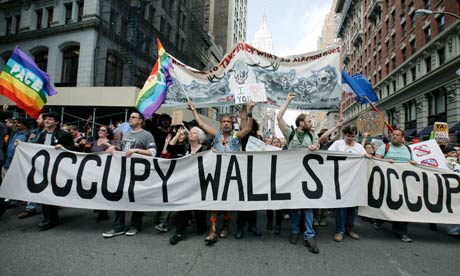(Yes, Margaret, There is An Alternative)
I’d like to start with a confession. When I first descended upon the Bowling Green statue in Lower Manhattan on the morning of Saturday September 17, 2011 to discover a handful of people doing yoga, I was not impressed. While my spirits were raised when a larger, but still small group of people marched from Bowling Green to Zuccotti Park I did not believe that we were on the cusp of a historic moment. I had been involved in activism since I was a high school sophomore and as a result have participated in more protests than I care to admit publicly. At the time the events of that day didn’t seem particularly special or memorable.
Looking back a year later, never in my life have I been so glad to have been so wrong. Far from being just another protest, Occupy Wall Street is unquestionably among the most important social movements of the past decade (which truly is an accomplishment, because in spite of the media narrative of passivity the last decade saw sizable protests against the IMF and World Bank, the war in Iraq, racism, and for women’s and immigrants' rights). Occupy has captured the public imagination like no other protests since the 1960s.
As the one year anniversary approaches, the media narrative will most likely focus on what Occupy has accomplished. Perhaps the media will fixate on the fact that many of the encampments are gone (whether or not they will mention that these encampments were violently broken up by the police is another story). Of course, while no single individual speaks for Occupy, it doesn’t take much to realize that Occupy’s victories lie not only in the encampments. They lie in the newly mobilized activist networks that have waged (and even won) battles in their own communities--whether it be the many homes defended against foreclosure or Occupy Baltimore’s campaign against a proposed new youth jail.
Just as important as these victories is the impact Occupy Wall Street has had in shifting the dialogue concerning economic issues. For decades, the spectrum of acceptable discourse has been rapidly closing. At the beginning of the 20th century there was a vigorous debate about how humans might organize their society. Socialists, anarchists, syndicalists, and radicals of every stripe attracted sizable audiences. Even relatively mainstream intellectuals like John Dewey expressed dissatisfaction with the wage economy and proposed that true democracy meant not just popular participation at the ballot box, but in the workplace as well. In short, capitalism and democracy were not one in the same, but were instead deeply antithetical to each other.
Yet only eighty-some years later Margret Thatcher, one of the architects of the current neoliberal economic order, would chastise the people that there was “no alternative” to her particular brand of capitalist economics. What happened? First, we were told that there was no alternative to capitalism. Then, not only did we have to accept capitalism as the only viable economic system, but we could only choose a particular brand of capitalism: A deregulated, cutthroat brand of capitalism that mixes unchecked corporate power with a disempowered working class, free markets with accelerated rates of incarceration and police repression, tyrannical technocrats with diminished formal representative institutions, corporate welfare with gutted social services, and in times of crisis, bank bailouts with austerity.
There was no alternative. And every politician accepted it. If you lived in the United States it didn’t matter if you elected Democrats or Republicans, the policies were essentially the same (as were the corporate donors). Western Europe, where social democratic and socialist parties still existed in name, faced a similar closing of discourse.
Anthropologist David Graeber got it right when he said that Occupy was about the rediscovery of “the radical imagination.” While Occupy's coalition of supporters include everyone from left-leaning Keynesians to anarchists, Occupy’s power and appeal rests in its fundamental core assertion than there is indeed an alternative. It is the rejection that private profit is the only valid raison d'etre for anything, whether it be education and healthcare or prisons and the military. Instead, Occupy proposes the radical alternative that the lives, well-being, and futures of flesh and blood humans are too precious to be traded along with slips of paper on the floor of the New York Stock Exchange.




